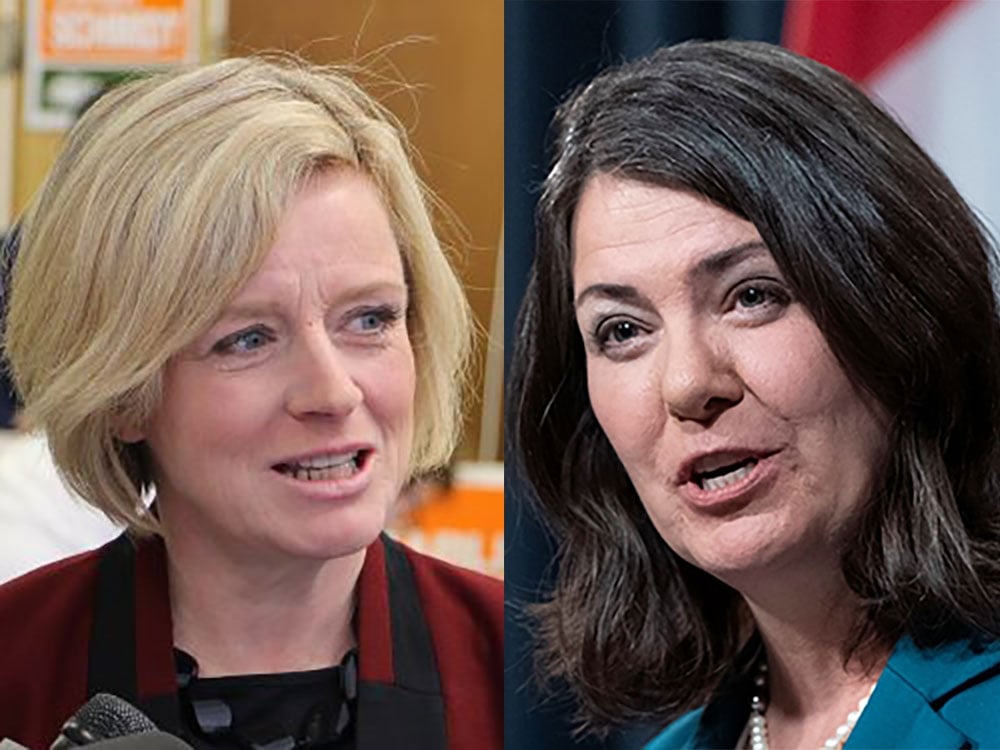Before every election, voters have to address two fundamental questions.
First, should the current government be re-elected? If the answer is yes, then the issue is closed. If the answer is no, then question two is asked. Should I vote for the opposition party?
Sometimes, the answer is yes (such as Alberta’s 2015 election, when the NDP won), but in other cases, the answer is no (such as Alberta’s 2012 election) and the government is re-elected.
In the May 29 Alberta election, the answer to question one for many people is no. What the next four months will determine is whether the answer to question two is yes or no.
What complicates the situation is that Premier Danielle Smith only became United Conservative Party leader on Oct. 6. So will the election be fought on her record or on the larger record of former Premier Jason Kenney?
This is a common situation for Alberta conservatives. Premier Ralph Klein was elected in 2004, but was replaced by Ed Stelmach in 2006. Stelmach won the 2008 election, but was replaced by Alison Redford in 2011. Redford won the 2012 election, but was replaced by Jim Prentice in 2014. Prentice broke the cycle, and was defeated in 2015 election by Rachel Notley and the NDP. The cycle returned when Jason Kenney won the 2019 election, but was forced out before he could run for re-election.
Throughout her leadership race, and as premier, Smith has tried to distance herself from Kenney. Those interested in Alberta politics need to read a new volume — Blue Storm: The Rise and Fall of Jason Kenney — edited by myself, Richard Sutherland and the late David Taras, is a comprehensive analysis of the Kenney government. Blue Storm’s contributors examine many different issues, but two themes dominate the book. First, how Kenney tried to implement his 2019 campaign pledge of “jobs, economy and pipelines.” Second, how this economic agenda got side-swiped by the COVID-19 pandemic.
As a non-caucus candidate, Smith won her leadership on policy initiatives that were absolute critiques of Kenney’s approach to these themes.
First, she promised an Alberta Sovereignty Act that would allow the provincial government to nullify federal laws and regulations if the legislature determines the federal government was intruding into provincial jurisdiction.
Smith argued that the federal government’s perceived anti-oil-and-gas policies (environmental impact assessment requirements, the tanker ban off the B.C. coast, carbon tax) were not sufficiently opposed by Kenney. This ignores the fact that Kenney created a war room to advocate for Alberta’s oil and gas sector, created an inquiry into environmental non-governmental organizations, sued Ottawa over the federal carbon tax and regularly verbally bludgeoned the Trudeau government.
The failure of Kenney’s initiatives to build new pipelines and bring back Alberta’s former prosperity paved the way for Smith who promised a more extreme response.
The second was re-litigating COVID-19. Smith and her supporters fundamentally opposed the public health measures that were introduced to constrain COVID and openly questioned the value of vaccines.
Already the Smith government has fired former Chief Medical Officer of Health Deena Hinshaw, publicly apologized for COVID-19 restrictions and directed Minister of Justice Tyler Shandro to “take any necessary legislative or regulatory steps to prohibit discrimination on the basis of COVID-19 vaccination and/or booster status.” It has appointed Preston Manning to lead an inquiry into the harm caused by federal and provincial government public health measures during COVID-19.
There are also serious allegations that the Smith government has contacted Crown prosecutors and pressured the justice department to drop charges related to the Coutts blockade, which shut down the major Canada-U.S. border crossing in the province in sympathy with the convoy on Ottawa, and other violations of public health orders.
A challenge for Smith in distancing herself from the Kenney record is that many of her cabinet members are the same ones. For example, Shandro was health minister for much of the COVID period, Health Minister Jason Copping introduced the vaccine mandate and Environment Minister Sonya Savage was formerly the energy minister who oversaw the war room and Allan Inquiry.
In addition, several of her UCP leadership rivals held a press conference lambasting the Sovereignty Act, but now sit in Smith’s cabinet.
Facing off against Smith is NDP Leader Rachel Notley, who served as premier from 2015 to 2019. Not only was Notley the only premier to serve an entire term in office in 20 years, but if she wins the 2023 election, would be the first premier to lose an election and then win one.
Unlike the UCP, there is no internal drama within the New Democrats. The party supports standing up for Alberta, but without violating the Constitution. And instead of rhetorical confrontation, they promise an NDP government would sit at the table with Ottawa over energy projects like carbon capture, hydrogen and small nuclear. On COVID, the NDP has a much more consistent position of supporting stronger public health measures.
When Albertans go to the polls in less than four months, the contrast between the UCP and the NDP could not be any more striking.
But Smith has a more difficult job than Notley as she tries to balance supporting, and opposing, the record of the Kenney government. ![]()
Read more: Politics

















Tyee Commenting Guidelines
Comments that violate guidelines risk being deleted, and violations may result in a temporary or permanent user ban. Maintain the spirit of good conversation to stay in the discussion.
*Please note The Tyee is not a forum for spreading misinformation about COVID-19, denying its existence or minimizing its risk to public health.
Do:
Do not: